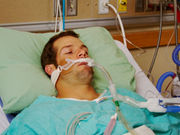Poor sleep has adverse effect on ICU recovery process and is linked to negative ICU outcomes
FRIDAY, Aug. 26, 2016 (HealthDay News) — Most clinicians believe that sleep in the intensive care unit (ICU) is poor and that poor sleep adversely affects patient outcomes, according to a study published in the August issue of the Annals of the American Thoracic Society.
Biren B. Kamdar, M.D., from the University of California Los Angeles, and colleagues examined providers’ perceptions and practices regarding sleep in the ICU. The Sleep in the ICU Survey was administered to ICU providers; 1,223 surveys were completed by providers from 24 countries.
The researchers found that respondents were mainly nurses and physicians (59 and 39 percent, respectively). Most respondents reported that ICU patients experienced poor or very poor sleep (75 percent) and that the ICU recovery process could be affected by poor sleep (88 percent). Poor sleep was also felt to be associated with negative ICU outcomes, including delirium development (97 percent), longer length of stay (88 percent), poor participation in physical therapy (87 percent), and delayed liberation from mechanical ventilation (83 percent). Sleep-promoting protocols were in place for 32 percent of providers; these providers tended to believe that their patients slept longer and had better quality of sleep.
“These findings highlight discordant provider perceptions and practices surrounding sleep in the ICU, as well as a possible lack of available evidence-based guidelines for promoting sleep in the ICU,” the authors write.
Full Text (subscription or payment may be required)
Copyright © 2016 HealthDay. All rights reserved.








